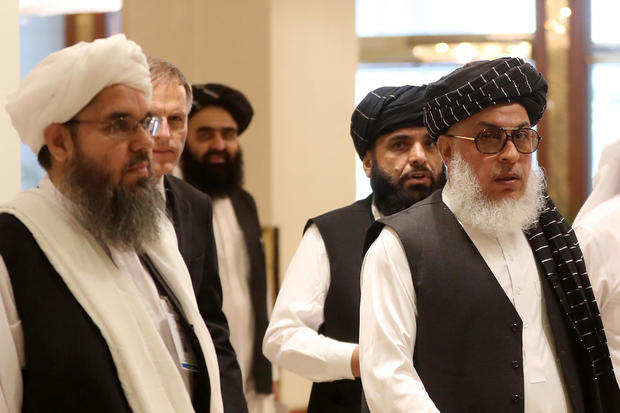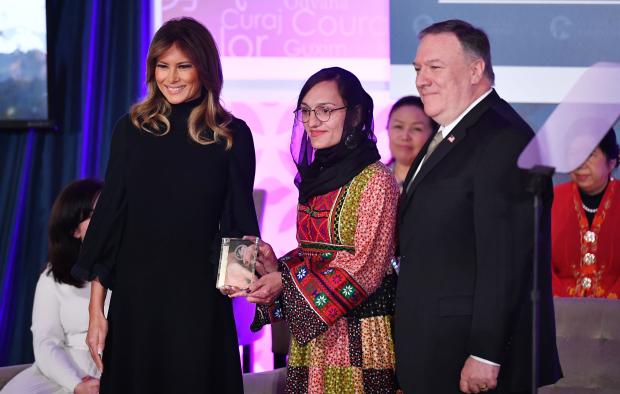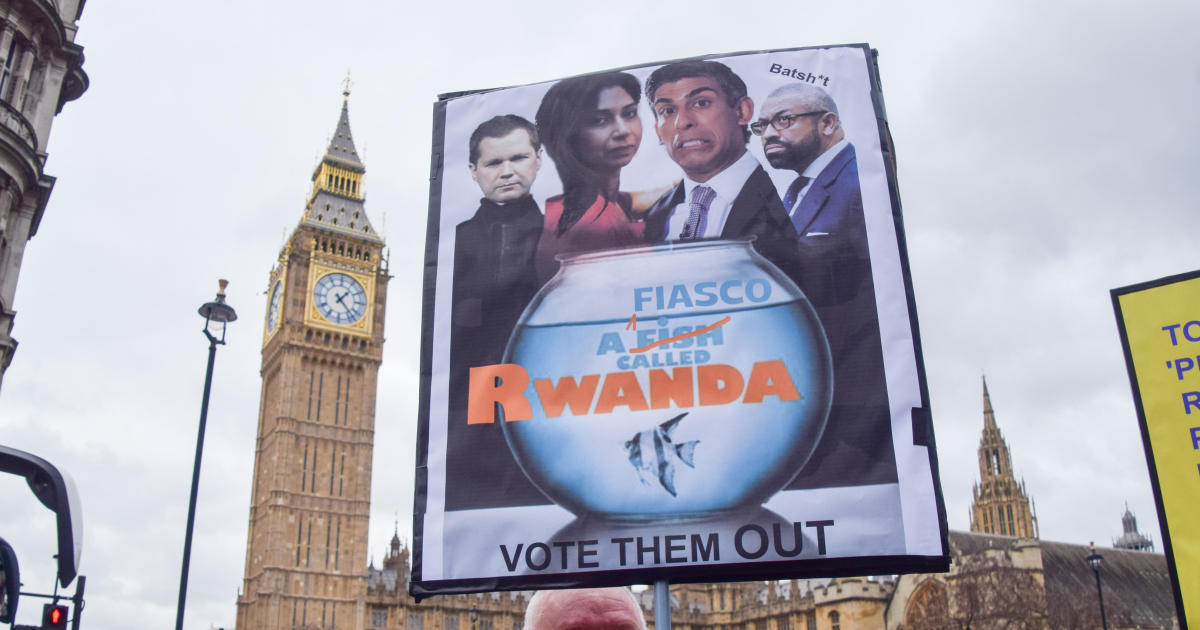What do the Taliban want out of the long-awaited "Intra-Afghan" talks?
Direct negotiations between the government of Afghanistan and the Taliban began over the weekend. The "Intra-Afghan" talks were the direct result of an agreement reached between the insurgent group and the Trump administration in February. The Afghan government was not directly involved in those negotiations, as the Taliban had refused to negotiate with Kabul until this week.
The Trump administration's core goal has always been clear: Make good on the president's promise to pull American troops out of the longest war the United States has ever fought.
Secretary of State Mike Pompeo was in Doha, Qatar, for the official start of the talks on Saturday, where he "urged the Taliban to seize this opportunity to forge a political settlement and reach a comprehensive and permanent ceasefire," according to a State Department spokesperson.
The Trump administration's plan to eventually pull the remaining 8,600 or so U.S. forces out of Afghanistan does not depend, directly, on the success of the dialogue. It depends on the U.S. deeming the Taliban to be in continuing compliance with the deal signed in February — most importantly, it must prevent other militant groups from using Afghan soil to plot against or attack the United States or its interests.
But the Taliban also must continue to reduce the level of violence in Afghanistan under the terms of the U.S. deal, and there it has leverage: If the insurgent group isn't satisfied with how the talks progress, it could resume the slaughter of Afghan politicians, security forces and civilians.
So what does the Taliban want out of these long-elusive talks?
CBS News' Sami Yousafzai spoke to a couple members of the group's political team, representing the Taliban in the Doha talks, and a former Taliban government minister. Given the sensitivity of the negotiations, none would speak on the record, but they did give a sense of the Islamic insurgency's starting positions in the negotiations, and what it wants out of them.
"The current Afghan system is totally corrupt and incapable," began one of the senior members of the Taliban's negotiating team, suggesting that forming a coalition with the "sinking ship" of President Ashraf Ghani's government would "drown the Taliban as well."
"Now it's the Taliban's turn," he said. "Hand over the Afghan regime to the Taliban for three to five years. The Taliban will work with the international community, especially the U.S. We will prove that as the Taliban was a hard enemy, in the future we will be a solid and trustworthy partner."
That stark starting position in talks aimed at brokering a ceasefire and, eventually, a renewed, legitimized role for the militant group in Afghan politics, may seem ominous. But defiance against a government the Taliban has dismissed as an illegitimate puppet of Washington for more than a decade isn't surprising, and it was delivered with nuanced hints at flexibility.
"The international community shouldn't be nervous," the deputy leader of the Taliban's negotiating team insisted to CBS News separately. Abbas Stanikzai said that, in return for being treated as a legitimate political entity in Afghanistan, "we will be nice this time, more responsible in respect to international law."
The senior Taliban negotiator, who spoke on condition of anonymity, said the previous Taliban regime — forced from power by the 2001 U.S.-led invasion of Afghanistan — was "inexperienced" and thus dismissed by the rest of the world, leaving it to "slide away from the international community."
Now, he said, the group has accepted that women and members of other religions have a role in government: "We won't mind having even a few women [government] ministers, and we will accommodate all minorities with justice in our system."
Another member of the Taliban's negotiation team, who also did not wish to be named, told Yousafzai that the group, "should be given a handy share in the system," suggesting leadership of "at least five key government ministries" and integration of the Taliban into the Afghan national security forces, all under "an Islamic regime acceptable to all Afghans."
The group has already stated that it will not support a female prime minister, or a woman on the country's high court.
Afghan women have warned for months that the Taliban must not be allowed to roll-back the gains made over the last two decades. Speaking directly to Secretary of State Pompeo during an event in Washington earlier this year, a young female mayor from Afghanistan urged the U.S. to stay vigilant.
"The women of my generation have not forgotten the reign of the Taliban, and we are, as always, worried for the future," Zarifa Ghafari said, turning directly to Pompeo. "Therefore, let me ask for your continued support to ensure the Afghan Peace Process does not erase the gains that have been made since the dark days of the Taliban regime."
Even Ghani's government appears to have acknowledged, by sitting down for talks with the militant group, that the insurgency currently in control of about half the country's territory is too powerful to ignore.
"The Taliban are a reality on the ground in Afghanistan," the first negotiating team member told Yousafzai. "Only the Taliban can end this war and bring stability into Afghanistan."
The Taliban officials acknowledged, as did Pompeo, that getting there won't be quick or easy. They also stressed that, unlike the governments in Kabul or the U.S., the militant group is in no rush.
"The Taliban are tired of fighting, but won't waste the sacrifices of the last 20 years," said the senior member of the negotiating team. The group, "can't walk away without results."
"At the moment the U.S. and Afghan governments have no plan B," the official said. "Only the Taliban have a plan A and B. Our plan A is a peaceful political solution, and Plan B, definitely a military takeover."
If the talks do falter, the U.S. has few good options. If the Taliban leaves the negotiating table and resume its war on Afghan forces and their foreign backers, President Trump could be urged by his own military commanders to halt, or even reverse his ongoing drawdown of American forces in the country.
The former Taliban government minister who spoke to Yousafzai drove home that point. The Taliban, he said, "has upper hand in the situation, and we know how to mobilize this situation in the Taliban's favor."





